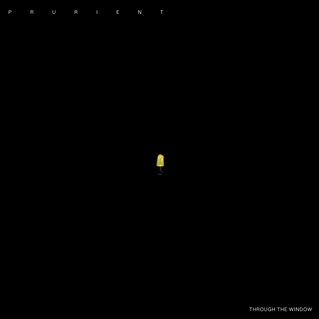Concluding her benchmark book The Virtual Window, the late cinema scholar Anne Friedberg recalled with sadness the suicide of philosopher Gilles Deleuze. In 1995, after more than a decade of suffering from a suffocating pulmonary disease, Deleuze threw himself through the window of his Paris apartment. I often wonder what might have been going through his mind between that initial launch and the final impact. I imagine that especially Deleuze recognized the irony of his fatal violation of the window’s restrictions, an abysmal liberation from that which frames what we may see and not touch, observe but not participate in, bear witness to yet never fully know.
Prurient’s Through The Window, a three-cut techno tour-de-force released this month on the Blackest Ever Black imprint, is at once limiting and liberating. It’s a prequel of sorts, written during the same sessions as 2011’s Bermuda Drain, a recording that set Prurient’s work apart from concurrent fare, and sparked Dominick Fernow’s alliance with co-conspirator and BEB label boss Kiran Sande. Through The Window‘s bookend tracks are substantially lengthy, and profoundly fearsome. Compositionally, they mimic the flows of codified data: these epics stream along for a time, change inconsequentially on the surface; but closer audition reveals how their features repeat and differ in subtle and unfolding ways. Fernow frames cinemascope panoramas that apparently fill the sonic field until, abruptly, another window opens.
Its title track slides in through a cracked machinic foursquare pane with déclassé drones and seductive mumblings, wedged open further by a glossy minor key synth phrase that accompanies the song’s first steps onto dance floor anthemic terrain. ‘You Show Great Spirit’, however, is the glistening masterwork here, evidence that Prurient doesn’t just recite the lingo of lower, classier techno; he’s whetted his own dialect. This record may appear an exercise in obsessive repetition, to those familiar with Fernow’s work as Vatican Shadow and elsewhere. Obsession and repetition then become objects of inquiry and the subjects themselves: obsession and repetition serve as both the music’s window and its frame.
Scholar of new media N. Katherine Hayles sees valuable promise in the "structural affinities" between computer code, trauma, and the background programmes that operate behind our windows of awareness, so to speak. In her 2008 essay Traumas Of Code, Hayles writes that code can act as a "conduit" through which to dispel disturbances, "without being trapped within the involuntary re-enactments and obsessive repetitions that typically constitute the acting out of traumatic experience." Fernow’s formidable oeuvre signals a wider cultural turn amongst forward-moving electronic music toward meaningful obsession and repetition. Chants, incantations, and mantras are invoked in circles, in cycles, repeated ad infinitum, language translating into pure code. Beyond a politics, poetics, and erotics, Through The Window represents a theraputics of reiteration.
More and more, windows shape our everyday experience – the ongoing fenestration of the world. Perception draws perspective through the architectural window; we watch as we glide past from the windows of vehicles in motion, noses smudged against the glass. We conceive of everything we do on our computing machines as taking place in windows. With their dumb process of framing – itself an agentic act that is never-not contrived by human hands, for human senses – windows simultaneously produce positive and negative space, calling attention to what’s within and without them. Never mind the doors of perception, to truly explore the limits of consciousness, we must go through windows.


